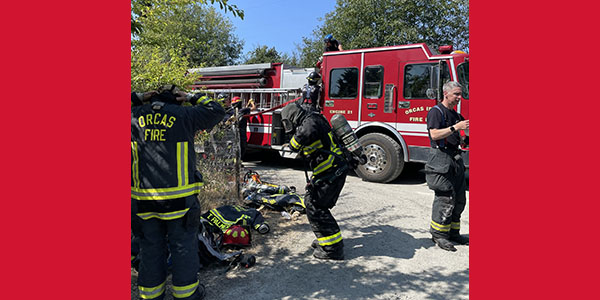Many Orcasians, with holiday horror stories of airport strandings and freeway logjams, are returning home on our reliable Washington State Ferries.
For all its budget problems, WSF runs safe, clean boats on a reliable schedule. Think how often we hear of Phillipine ferries sinking, and of European ferries running on a maybe-maybe not schedule. This marine highway is cause of great concern to islanders, but we hope it continues to provide a stable, if expensive, means of transportation on and off the islands.
The ferries also remind me of a pub or church, where random members of the community gather to toss around ideas of common interest. Last Sunday, as I returned from a week off-island, having succeeded at relaxing, gathering family members around, and preparing heart and home for celebration — but having failed at transporting family to and from the airport because of icy driving conditions — I chatted with three
Our talk turned to the work of investigative journalism exposing the dangers of staph infections in hospitals, motivating the
In December 2007, the New Yorker magazine reported on a simple, but effective, means of combating hospital infections — a rudimentary checklist:
“In 2001, though, a critical-care specialist at
….
Pronovost and his colleagues monitored what happened for a year afterward. The results were so dramatic that they weren’t sure whether to believe them: the ten-day line-infection rate went from eleven per cent to zero.”
For more on this study, go to www.NewYorker.com and type in “Annals of Medicine” +Checklist by Atul Gawande, for Dec. 10, 2007.
By reporting on the work of others, their successes and failures, journalists make public problems, processes and solutions that can benefit the community dramatically. Sometimes the research is complex, as I’ve found in reporting on the water rights issues in Washington State and on Orcas Island; sometimes simple checklists and naive questions lead the way to the crux of the matter, as in checklists and observation.
So again, as I talked to my island neighbors on the ferry — a retired teacher, artist and a business consultant — we discussed the work we all have ahead of us in climbing out of the worldwide economic dilemma.
The teacher proposed that retirement plans and benefits be changed so that no one could draw on their retirement pensions before the age of 62.
The business consultant commented that this solution could only be implemented if the unions agreed, which would never happen, he predicted.
The teacher said that the US Congress should lead the way, voluntarily agreeing to such a limitation, but the consultant forecast that only with municipalities and states going bankrupt would union contracts be broken and all retirement agreements be revisited.
This is what our neighbors are thinking. It seems to me that it is worthwhile, as a known activist community, to contact our congressional representatives and ask for a response to deferring retirement pensions such as the ones they receive, until a reasonable age, such as 62.
Any comments?






